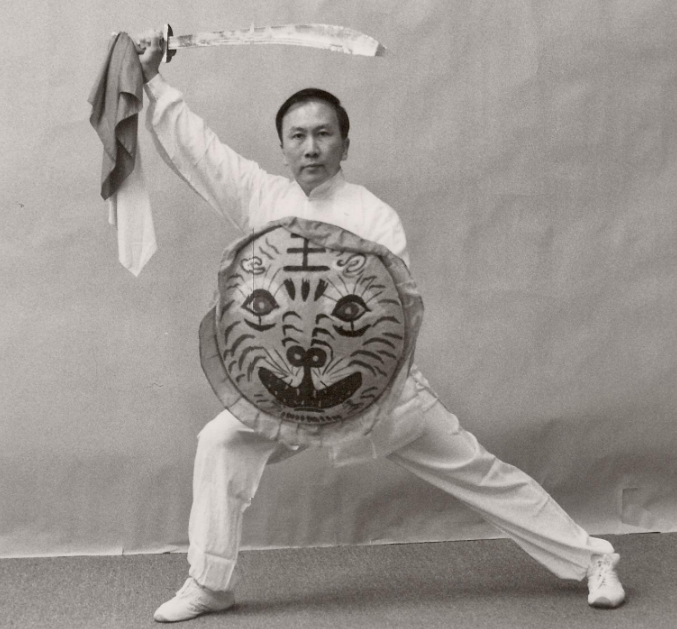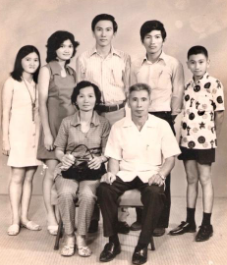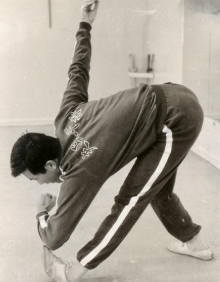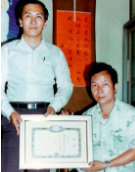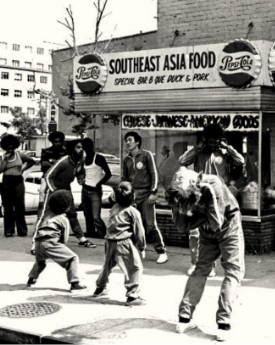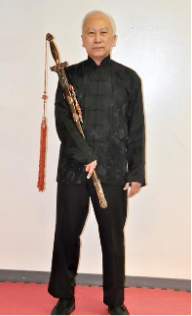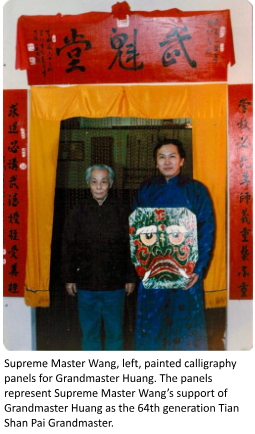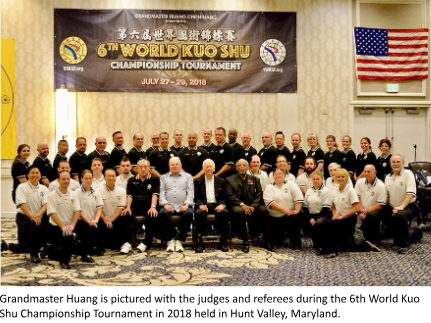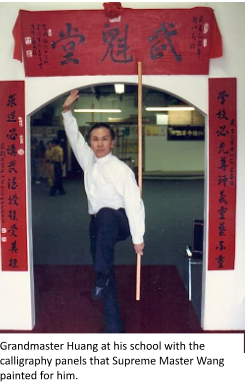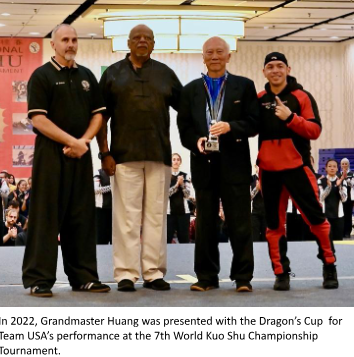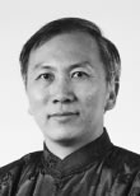
- Head Coach of the United States National Kuo Shu Team, 1986 – 2000
- Grandmaster – 64th Generation,Tien Shan Pai, 1990
- Founder and President – United States Kuo Shu Federation (USKSF), 1991
- Director & Chief Arbitrator – 7th World Kuo Shu Championship Tournament (Taiwan, ROC), 1992
- Baltimore County Executive Ruppersberger proclaimed April 26 “Huang, Chien-Liang Day”, 1998
- Maryland Governor Glendening proclaimed April 26 “Grandmaster Huang, Chien Liang Day”, 1998
- “One of the Most Impactful Martial Artists in the 20th Century” (Inside Kung Fu Magazine), 1999
- Inducted into the US Kuo Shu Hall of Fame, 2000
- Founder and Chairman – The World Kuo Shu Federation (TWKSF), 2002
- “One of the Most Influential Chinese Martial Arts Masters of the Past 30 Years” (Inside Kung Fu Magazine), 2003
- Certified 10th Duan by TWKSF, 2004
- Certified 10th Duan by the World Traditional Martial Arts Union (WTMAU), 2005
- Inducted into the Dong Han Taoist Sect Lifetime Achievement for Excellence, 2006
- Baltimore City Mayor Sheila Dixon proclaimed April 26 “Grandmaster Huang, Chien Liang Day”, 2008
- Baltimore County Executive Kamenetz proclaimed April 26 “Huang, Chien-Liang Day”, 2013
- Certified 10th Duan by Federation International of Grandmasters, 2017
- Inducted into The World Kuo Shu Hall of Fame, 2018
- Sponsor – 6th TWKSF World Kuo Shu Championship Tournament (Hunt Valley, MD), 2018
- Doctor of Philosophy – College of Advanced Education and Martial Arts
- Honorary President – International Song’s Xing Yi Quan Association
- Honorary President – Hua Yue Xin Yi Liu He Ba Fa Yan Jiu Zong Hui
- Adjunct College Professor in Tai Ji Quan (for over 25 Years)
My American Journey
By Grandmaster Huang, Chien-Liang (黃乾量)
Thinking about my past often fills me with nostalgia as I recall all those who have had an impact on my life — most notably my Shi Ye — and the trials, tribulations, and successes that have brought me to where I am today. While my journey was not always easy, I remained steadfast in my goal to honor my teacher and pass on the Tien Shan Pai Kung Fu system to future generations, as it was passed on to me.
My birth name is Huang, Wee Hoo (黃偉鶴).
I was born in the countryside of Malaysia in 1948. My father was very strict, and this laid the foundation of a strong sense of discipline in me. Something my martial arts training only enhanced. Martial arts has always been a big part of my life. When I was 12, I started studying Southern Style Kung Fu. I continued until the summer of 1967 when I was 19. It was at this time that I moved to Taiwan to attend the National Chung Hsing University.
In the fall of 1967, I began studying martial arts with my Shi Ye, Supreme Master Wang, Chueh-Jen (王玨錱). For those who are not familiar with the term, Shi Ye is the traditional reference for a teacher of Northern Chinese martial arts.
My Shi Ye was a very accomplished teacher. He was also very stern and didn’t talk much. He was from a wealthy family, but during the Chinese civil war, he had lost nearly everything and had to move to Taiwan. There, he taught hand-to-hand combat for the Chiang Kai Shek Special Forces before settling down in Taichung, Taiwan.
The years I spent with Shi Ye were some of the best years of my life. I learned the importance of discipline and dedication through Chinese martial arts. I practiced every day. Before my school classes began, I would practice around the basketball courts. After classes, I rode my bike to Shi Ye’s house for more training. When I first started, I would go to his house three times a week until I was allowed to participate in free fighting. Then, I trained five times a week. Often our training would end late at night, and I remember waiting for what seemed like hours for the charcoal to heat up so I could take a shower when I got home. Still, I enjoyed every minute of training, and it was all worth it. Because of Shi Ye’s emphasis on self-control and discipline, throughout my life, I was able to maintain focus, integrity, and hard work.
In 1971, I also started studying with Grandmaster Chen, Jin-Bao. I will not go in depth about him in these remarks, but I wanted to acknowledge that I learned a great deal from Grandmaster Chen during the 12 years that I studied internal and external martial arts with him.
Grandmaster Chen has an immense depth of knowledge, and he also had the privilege of learning directly from Grandmaster Chen Pan Ling.
An Invitation to America
In 1972, I was invited by a Tien Shan Pai senior classmate to teach Kung Fu in the United States for $170 per week. At the time, I had not met my senior classmate in person, but I knew his brother from our Tien Shan Pai training in Taiwan. I did not know much about America, either. The impressions I had were from what I saw in movies and read in stories.
I was in my final month of college, and while I had received several professional opportunities in Malaysia, Singapore, and Thailand, my senior classmate’s invitation intrigued me. I could remain deeply involved with Tien Shan Pai and experience the wonders of the United States firsthand. So, I accepted his offer.
I arrived in the United States on April 26, 1973. I was 25 and in a new country with nothing but my bags and the knowledge of Kung Fu, but I was hopeful. It was the start of a new chapter in my life.
However, when I reached Washington, D.C., the senior classmate who invited me told me that he would only pay me $50 a week. The news was concerning because I had traveled across the world and wasn’t sure how I would fare on the small salary. I didn’t seek government assistance, so ultimately I had to borrow money from my senior classmate and live at his home.The circumstances weren’t ideal, but I was determined to make it work.
A few months later, my senior classmate opened a school in Bethesda, Maryland, and put me in charge. He told me that I should use an English name so it would be easier for American students to pronounce and remember. Since I was still new to the U.S., I did as I was told and adopted the name Richard to use at that school. I have not used it since. My salary was increased a bit, but it was still not enough to rent housing, so I lived at the school. I relied on a student’s kindness for shower facilities before I got a Sears charge card and purchased my own shower equipment, which I connected to a utility sink in the school. I used a portion of the carpeted floor as my bed and bought a heater to stay warm in the winter. Daily meals consisted of instant noodles, and on special occasions, fried chicken. Despite the struggles, I enjoyed teaching Kung Fu and watching students progress. I remained optimistic and kept working, determined to make a better life for myself and to help promote Tien Shan Pai in the United States.
A School in Ohio
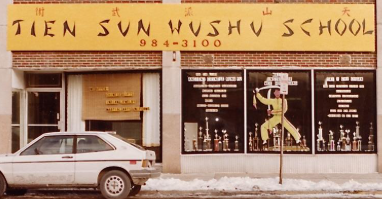
An opportunity arose in January 1975 for me to open my own school in Ohio. With the help of one of my students, I relocated to Cincinnati to open Tien Sun Wushu School. To my knowledge, it was the first time anyone used the Tien Shan Pai name in the U.S. Now that I had my own school, I decided to adhere to a more traditional way of teaching, and one that not only emphasized strong martial arts, but also development of good character: respect, loyalty, humility, and compassion.
The methods of training that I used would pay off. In 1980, I brought a team of six students to the International Chinese Kuo Shu Federation’s (ICKF) 3rd World Tournament in Hawaii. No one expected our freshman team to even place, let alone return home with six trophies.
In 1981, I invited Supreme Master Wang to the United States, and he lived in my apartment for a few months with my wife and newborn. It was the first of several visits my Shi Ye would make to America.
Despite juggling two jobs and caring for my young family, I knew it was my responsibility as a student to also take full care of my teacher. That meant paying for all his expenses, including his airfare, food, and shopping. I was already struggling to make ends meet, but I wanted to make sure Shi Ye’s visits were as pleasant as possible, and I was glad to be able to contribute to the advancement of Kung Fu.
During this time, Shi Ye selected me as his formal disciple and, during my discipleship ceremony, he gave me the Dao name Chien-Liang (乾量), which means “a person with great capacity.” This was a huge honor for me, and it was extremely important as it represented official recognition that I am a 64th generation Tien Shan Pai disciple.
In traditional Chinese martial arts, one cannot be considered close to a teacher without being a formal disciple. And a student is not considered a formal disciple until they go through the full discipleship ceremony. When you become a disciple, it means your teacher considers you a part of the family, and it indicates that you are on a path to having the chance to learn the secrets of your martial arts style.
Supreme Master Wang also presented to me a special disciple sword with a poem he had carved onto the sheath.
Passing on the Torch
Shi Ye requested that I choose some students to become my disciples. This was an historic moment, as it was the first group of American students who would become the 65th generation Tien Shan Pai disciples. I was particularly happy about this because Shi Ye was present, and not only was he an important witness, he was also able to supervise the formal discipleship ceremony as we passed on the torch of Tien Shan Pai to a new generation in a new continent.
In 1982, when I had saved enough money, I moved back to the East Coast to focus on teaching Chinese martial arts. I opened a school in Gaithersburg, Maryland, and shortly after, I purchased the school in Towson, Maryland, from my senior classmate’s brother. I was very excited, but was met with some unforeseen hurdles. At the Towson school, I couldn’t collect tuition from any of the current students because they had already paid my classmate for the entire year. It was a setback, but not something I couldn’t overcome.
Over time, my schools grew with more students. I continued to emphasize training and teaching in the traditional way, with a focus on discipline, respect, loyalty, and humility. Some of my students were also very devoted to teaching Tien Shan Pai, including my disciple Joe Dunphy, who would later take over my school in Gaithersburg.
Taking on My Disciple Name
I founded the Tien Shan Pai Association in 1986 to better promote the art, and I approached my Shi Ye about using my disciple name to promote Tien Shan Pai. He was delighted and encouraged me to do so. Since then, I have proudly gone by the name Chien-Liang, which he bestowed upon me.
In the 1990s, I engaged some of my senior students to assist in running the Tien Shan Pai Association, and that really helped the organization grow. The association was eventually renamed the International Tien Shan Pai Association to recognize students from other countries.
Shi Ye’s final visit to the U.S. was in 1989, during the International Chinese Kuo Shu Federation’s 6th World Tournament in Las Vegas. He was ill, and despite his positive demeanor, I worried about his health even after he returned to Taiwan.
The following year, after returning from a trip to Germany where I had taught a seminar, I received a message that something had happened to Shi Ye. I quickly called Shi Ye’s wife, and she told me that Shi Ye had passed away. I flew to Taiwan as soon as I could, and Shi Ye’s wife and daughter were kind enough to accompany me to visit his final resting place.
As I look back, I realized that during Shi Ye’s visits to the United States, he was solidifying my position with him and the Tien Shan Pai system. Shi Ye was a man of few words, but his actions spoke volumes.
In 1985, during one of Shi Ye’s visits, he had painted three calligraphy panels for me to hang in front of my Towson school entrance. These calligraphy pieces were significant because it represented Shi Ye’s confidence in my ability as a martial artist, and it showed his support of me as the 64th generation Tien Shan Pai Grandmaster.
I learned a lot about Shi Ye while he lived with my family, and I began to appreciate some of his interests outside martial arts. I was even able to help him put on a successful painting exhibit in the United States. Although I never felt like I did enough, I felt honored and humbled when I received verbal and written praise from my teacher.
Along with Tien Shan Pai, I was equally committed to promoting Kuo Shu. Kuo Shu means “National Art,” and it is synonymous with traditional Chinese martial arts.
I sponsored my first tournament in 1988 at the Towson Sheraton Hotel. It was an honor to watch martial arts practitioners from different parts of the world come together to compete. Today, the annual tournament attracts competitors from nearly 30 countries worldwide. We have been honored to receive federal and local government recognition since 1990, and to have White House representatives attend the event since 1994.
To further solidify recognition of Kuo Shu in the United States, I sponsored the first American Cup tournament in 1991 and revived the traditional Lei Tai platform for full-contact matches, officially bringing Lei Tai to America.
That year, I also founded the United States Chinese Kuo Shu Federation and served as its president, and was vice president of the International Chinese Kuoshu Federation in 1992.
Since 1991, I’ve had the privilege of helping to advance Kuo Shu worldwide. I served as head coach of the U.S. Team at numerous world tournaments. I also helped bolster Kuo Shu’s presence in Europe, South America, the Caribbean, and Russia, and had the honor to help run and sponsor international and world tournaments across the globe. Although I have received certificates of merit and Kuo Shu medals from multiple ICKF presidents for my contributions, I never felt like my work was done, and that I could always do more for Chinese martial arts.
I have always thought that it was important to give back to your students and community because true martial arts is never about the individual, it’s about helping others. I am so proud that my students are now teachers, training their own students to become champions in competitions and in life. Through my schools and students, we have sponsored, organized, and participated in many charity events over the years, helping to raise tens of thousands of dollars for people all over the country.
Discipline and Perseverance
Sometimes people ask me, “How did you do it?” My answer is simple. Throughout my American Journey, I have been able to overcome the obstacles in my life through discipline and perseverance.
Furthermore, as a student and disciple, I always believed that I wasn’t doing enough. This led me to do whatever I could to learn as much as I could no matter the circumstances.
From 1975 to 1986, I would return to Taiwan every chance I had to train. When Shi Ye visited the United States, I took every opportunity to learn new techniques and receive additional corrections on what I had learned before. Until Shi Ye’s passing, I never stopped learning, whether in person or through letters and videotapes I sent for feedback. This allowed me to learn a lot of details and so-called “secrets.” My Shi Ye praised me for my in-depth knowledge of the three major areas of Tien Shan Pai: fighting, Qin Na, and Nei Gong. More notably, Shi Ye taught me most of the Tien Shan Pai seven-pole-techniques set and wrote a special poem that detailed its core principles. The poem enabled me to understand the rest of the set. Only a small number of Tien Shan Pai practitioners have mastered a few of the pole techniques — I am grateful to be the only one, to my knowledge, who was able to learn the entire set. It has been an incredible journey. I have traveled to more than 30 countries to promote and teach martial arts, and we now have Tien Shan Pai practitioners all over the world.
I am humbled to have received recognition from five United States presidents for my promotion of Chinese martial arts, and to have had, over the years, Maryland Governor Parris Glendening, Baltimore City Mayor Sheila Dixon, and two Baltimore County executives proclaim April 26 as “Grandmaster Huang, Chien-Liang Day.” I am also very thankful for the many citations and certificates of recognition from Congress members including senators Benjamin Cardin, Barbara Mikulski, Chris Van Hollen, and congressman C.A. Dutch Ruppersberger; governors including Glendening, Robert Ehrlich, and Martin O’Malley; county executives; and mayors.
I am deeply appreciative of all the opportunities I have had. It fills me with a sense of gratitude and humility to have contributed to Kung Fu in my little way. None of this recognition would have been possible without the dedicated support of my disciples and students. I want to take this opportunity to acknowledge and thank them for their contributions.
I would like you to consider one more thought. If a boy who grew up in the countryside of Malaysia can do this, you can achieve even more. With perseverance and hard work, everything is possible.
I wish you all good health and happiness. Thank you for allowing me to share with you my American Journey.

